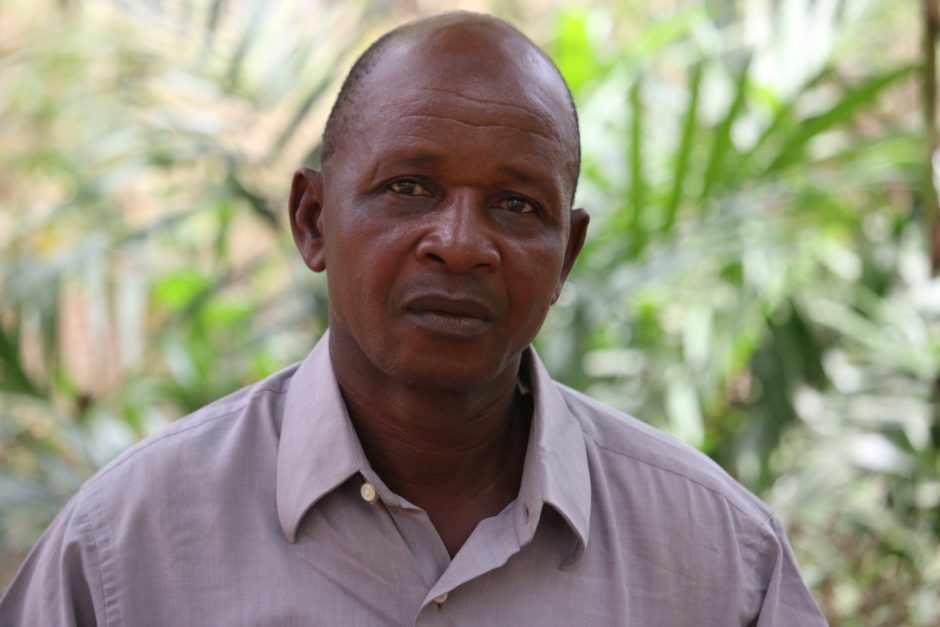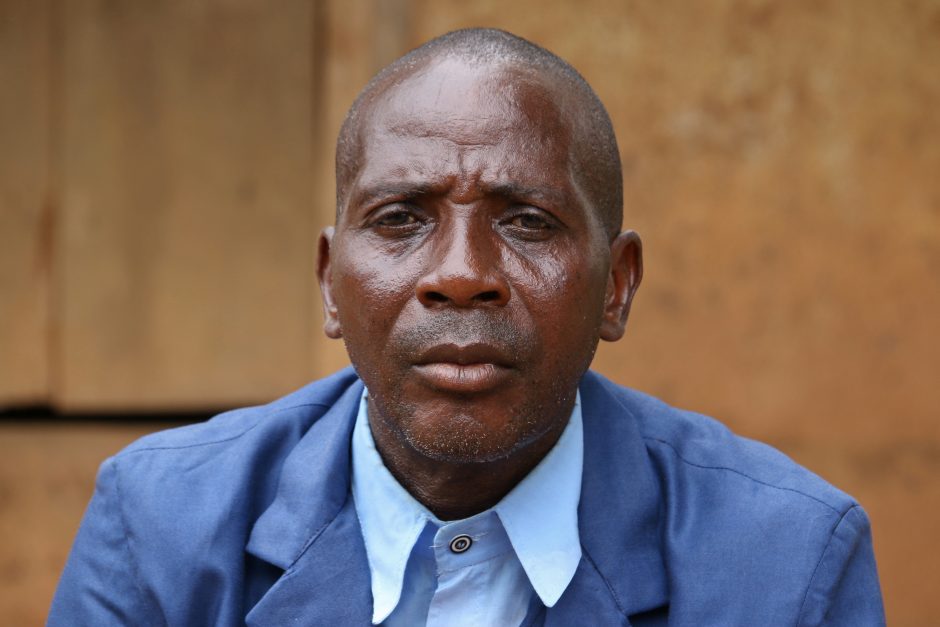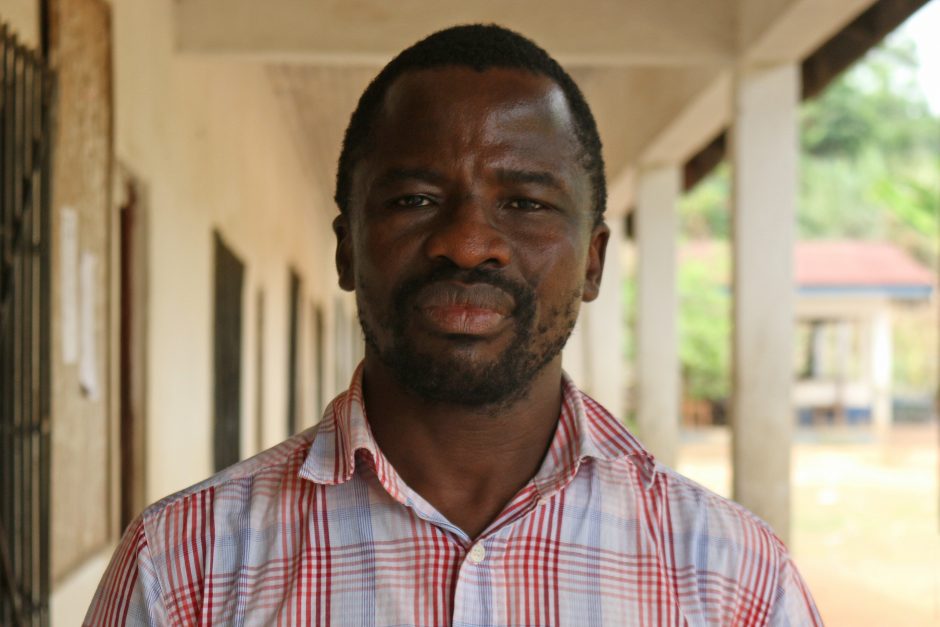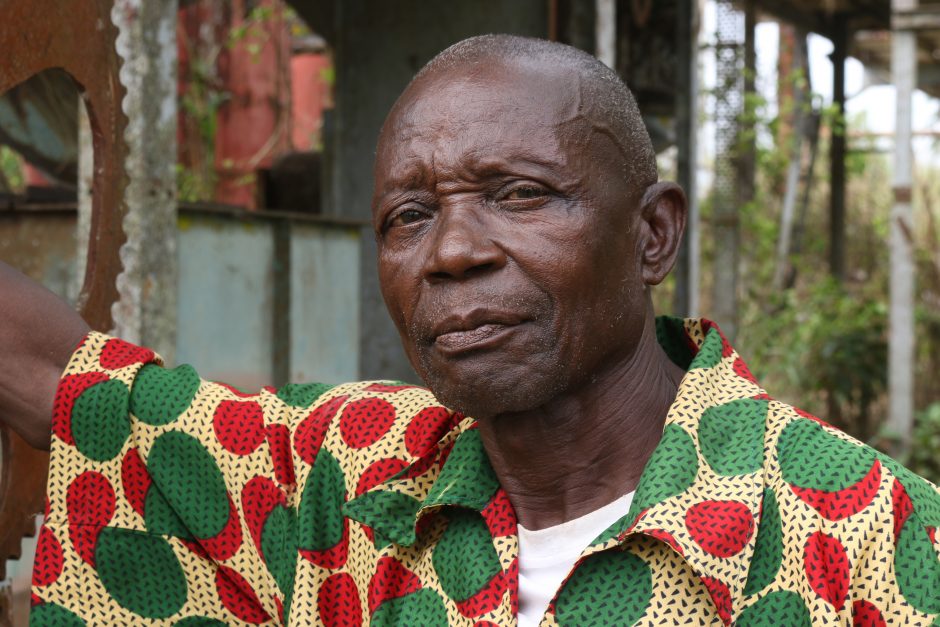FOYA DISTRICT, Lofa County, Liberia – The ruins of a factory sit on a major route in a town called Menigesua, towards the Sierra Leone border. Tall grass and weeds have engulfed what used to be staffers’ domiciles of this facility. Two huge, rusted metal tanks—that stored palm nuts before they were processed into palm oil—tower above everything else. The skeletons of gigantic machines are visible, too, as is the concrete beneath the bush that covers much of the yard here.
These are the remains of a once-prosperous palm oil mill run by the Liberia Produce Marketing Corporation (LPMC) before rebels of the United Liberation Movement of Liberia for Democracy (ULIMO) looted it in the early to mid 1990s, witnesses say.
ULIMO captured Foya District, Lofa County, from the National Patriotic Front of Liberia (NPFL) in 1993 and stayed here until 1995. The rebel group had been established two years earlier in Guinea by exiled Mandingoes, Krahns and runaway soldiers of the Armed Forces of Liberia (AFL). They attacked Lofa by crossing the border from Guinea, hitting first Voinjama District before besieging Foya, which would become their civil war stronghold.
ULIMO’s highest-ranking officer in Foya was a young rebel commander named Alieu Kosiah. Kosiah led the looting of the palm oil mill on several occasions between 1993 and 1995, according to several survivors interviewed by FrontPage Africa.
“It was very painful for some of us that saw what happened here when General Kosiah gave the order where he sent the team that was working under him to loot everything,” says Justin Fayiah, 56, a former guard with the National Palm Corporation (NPC), a subsidiary of the LPMC that provided a market for local palm nut farmers in Lofa and beyond. “They came and looted everything. There were cars that were shifting all those things to Guinea. The zinc that was here was a very good zinc, so they took it to Guinea to melt it to make pots.”
Fayiah worked at the factory from 1984 to 1990, when the Liberian Civil War broke out in Foya. An estimated 250,000 people died in the war, and more than a million were displaced.
Kosiah, 45, is on trial in Switzerland for alleged war crimes. Kosiah faces a maximum sentence of 20 years imprisonment in a Swiss prison. He had fled Liberia in 1997 to that European country after Charles Taylor—who led the NPFL that ULIMO fought against—became president. He lived peacefully in Switzerland as a permanent resident until November 2014, when Swiss authorities indicted him for war crimes.
Seven witnesses from Lofa accuse Kosiah of killing 18 civilians, sexually enslaving a woman, recruiting a 12-year-old boy to be a soldier, and eating a teacher’s heart. His trial finally began on December 3, after being postponed four times this year due to coronavirus.
Kosiah is the first person to be tried in a civilian court in Switzerland for war crimes and the second former ULIMO general to be prosecuted in connection to the Liberian Civil War. The first was Mohammed Jabbateh, known as “Jungle Jabbah,” who is serving a 30-year sentence in the United States for immigration fraud and perjury.
Kosiah’s trial is being held under universal jurisdiction—a United Nations doctrine ratified by Switzerland in 2011—that allows countries to try residents for crimes committed on foreign soil. Liberia’s Truth and Reconciliation Commission (TRC) in 2009 recommended a similar war crimes court for the country, but successive governments have not implemented it. The commission recommended that Kosiah and 49 others—including Former President Ellen Johson Sirleaf—be barred from occupying public office in Liberia for 30 years, over their alleged roles in the war.
In addition to murder, cannibalism, rape and conscription of a child soldier, Kosiah is charged with looting. In testimony over the past week, Kosiah admitted being in the hierarchy of ULIMO but denied the charges, saying he was not in Lofa when the crimes were committed. On Wednesday, he ended his testimony before a panel of three judges, insisting that he is innocent. The trial is expected to recommence in February, when the victims will testify.
Fayiah’s account corroborates the unidentified victims’ allegations, especially looting and forced labor, another charge that Kosiah faces. He says Kosiah and his men made him and other townsmen transport looted items to Sorlomba—the border town with Guinea that is a six-hour walk away.
The rebels jailed and held civilians in the factory’s large metal tanks to transport their loots, Fayiah and other witnesses say. Graffiti on the wall of one tank clearly reads: “Life can change.” But many reportedly lost their lives here. The dark cylinders are sweltering and suffocating, with only a few small holes for air to enter. It would have been difficult for those trapped like animals inside to breathe. Those who survived were forced into backbreaking work, Fayiah recalls.
“Kosiah used to have every one of us as slaves,” Fayiah tells FrontPage Africa in an interview at the looted facility. “They were giving us machines that were so heavy for me [to carry]. Whenever I fell down, [another civilian] would come and help me.”
‘ULIMO Taxi’
Fayiah was lucky to survive. Many people were killed en route to Sorlomba—the last Liberian town before the Guinea border—if they refused or were unable to transport ULIMO’s loots. One of the victims was Saah Patrick, a 62-year-old man.
“[Patrick] told them that the load was too heavy and he was tired,” recalls Godfrey Taycar, 57, the man’s nephew who was forced to serve as deputy mayor of Foya City during ULIMO’s wartime reign.
“They refused to allow my uncle to rest, even with his age,” says Taycar. “His brother, who was also one of the captives, asked to help him, but the ULIMO rebels refused.” After Patrick died, the rebels distributed the looted items he was carrying among other civilians, just as the victim’s younger brother had pleaded.
Amos Quermoullue, one Facebook user in a comment on the first part of this series—that focused on murder and other charges of violence against Kosiah—says he witnessed ULIMO forcing civilians to push vehicles to the Guinea border. The people called it “ULIMO Taxi.”
“My kinsmen were forced to push a fully loaded non-operational tractor to the Guinea border,” recalls Quermoullue, who says rebels also forced him one day to carry an “unbearable size” of pounded coffee beans on his head to the border. “As they (kinsmen) approached a hill, all of [the rebels] would advance their guns at the poor captives. At this point, the tractor moved even faster than a car with a brand new engine.”
Robert Taylor, the son of Chief Tamba Taylor—who chaired a power-sharing government in Monrovia involving ULIMO and the NPFL in 1995 and died in 2000—says Kosiah’s men stole and sold his father’s car. “We used to see the car in Guinea,” he tells FrontPage Africa in an interview at the late paramount chief’s residence, where he and other witnesses say Kosiah lived at the time. “We felt bad. It was our old man’s property.”
‘General Physical Cash’
The TRC detailed ULIMO’s pillaging in its report. In one incident in February 1993, ULIMO executed eight of its own officers for looting, according to the report. In another, ULIMO looted Fasama in Gbarpolu County and set the town ablaze in April 1995. Looting ranked as the fifth-highest crime recorded by the TRC, comprising 7,619 incidents or 4.7 percent of the human rights violations. It should be noted that the true numbers would have been even higher, since the TRC was only able to document a fraction of the crimes in the civil war.
In the TRC records, ULIMO committed 11,564 of the human rights violations and added another 6,079 when it split into ULIMO-K and J factions. Both numbers are much less than the 63,843 committed by the NPFL, the highest the TRC recorded. Yet, ULIMO is more notorious than its fiercest rivals in this Kissi countryside.
Under Kosiah, ULIMO was organized, according to townspeople. It was a business, and they called Kosiah “General Physical Cash” for his open love of money. ULIMO looted everything they could sell for cash across the border, including cocoa, coffee, palm oil, rice, handheld rice mills, furniture and zinc roofing sheets. Rebel teams would force civilians to lead them into towns and villages to capture more civilians to transport more loots. ULIMO dubbed those kinds of raids “Take-Go.” They even took Taycar’s wrist watch.
Enlisted as deputy mayor, Taycar interpreted for ULIMO, served as town crier and provided people to transport loots.
“[ULIMO rebels] put cans of oil on my head to carry at the waterside to go and sell it,” says Taycar, now a schoolteacher. “I was under duress; I didn’t work freely. They just put us there as leaders. As leaders, we could be disgraced at any time. It wasn’t just I alone, they did it even to the zone chiefs and clan chiefs who were made to carry load. If they even found coffee in any home, you as a citizen they would put it on your head and carry you.”
Taycar’s worst personal experience was when ULIMO forced him and the mayor of Foya, Eric Pongay, to drink one liter of cane juice after they failed to provide civilians to transport items. Taycar and Pongay, who died of natural causes after the war, were jailed in the trunk of an old car at Foya City’s roundabout.
One of ULIMO’s biggest alleged plunders was the scrapping of two generators in a power facility that supplied Foya with electricity prior to the war. The old powerhouse still stands today with what is left of the equipment and littered with broken glass from blown-out windows. Foya has not had public electricity since then.
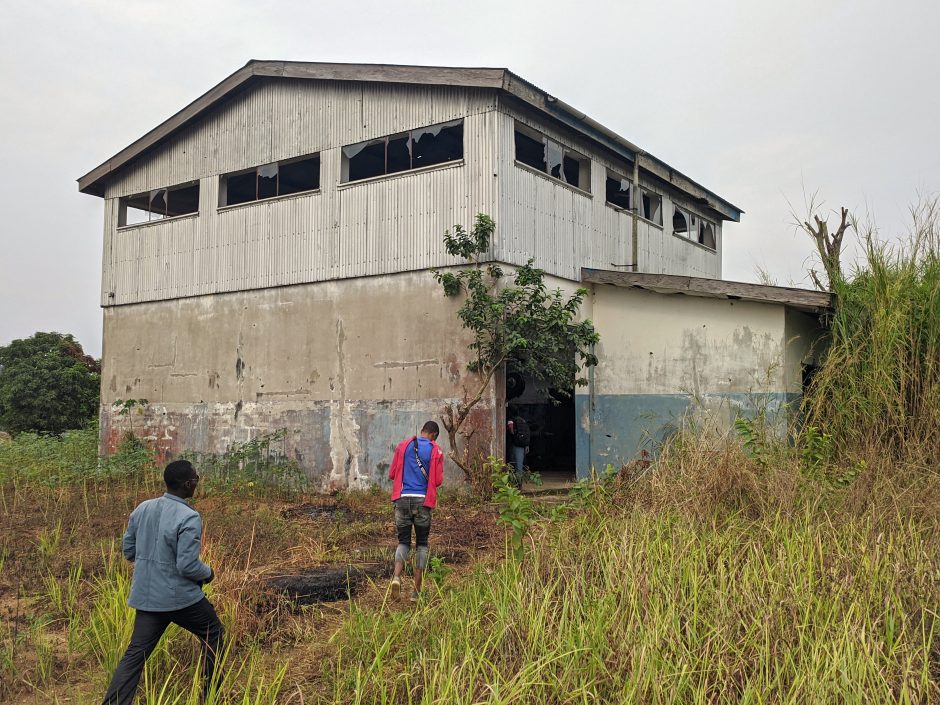
“We were on Kpormbu Road when they went and took the tanks and the machines,” Taycar says. “At that time, all the civilians were indoors, and only the two of us were out as civilians. They did that because they did not want anyone to see what they were carrying. That day, they took some things and carried them to Guinea.”
Perhaps, the most infamous of ULIMO’s lootings was done at the Foya Borma Hospital. The hospital was the sole, major health facility in the region, catering to people as far as Kolahun District. Kosiah and his men, after a number of previous attempts, allegedly plundered the hospital’s generator. Rebel fighters broke into the hospital warehouse and made away with medical and other equipment, war survivors say. Taycar recalls the rebels happened upon a huge stockpile of cash, and that is when Kosiah got his war name “General Physical Cash.” Taycar remembers other rebels as Daykue, General Fayia, “C.O. Pollute,” “Pepper and Salt,” “Ugly Boy,” and Kunti K., who is currently detained in France for alleged war crimes.
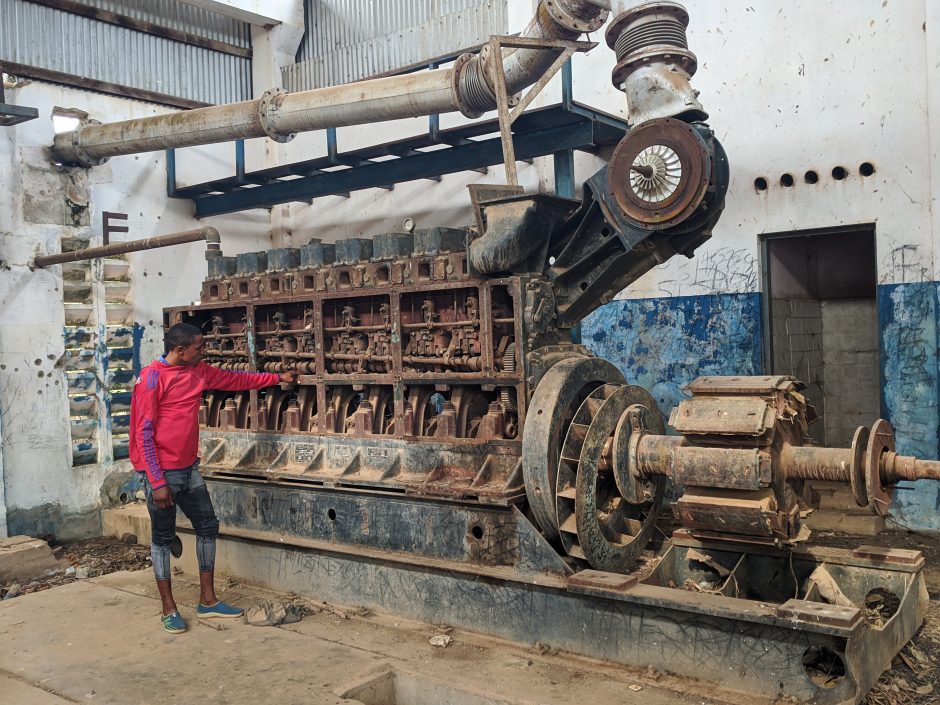
But ULIMO allegedly committed a more heinous crime at Borma Hospital than just looting. Saah Ndiminin, a schoolteacher with the Free Pentecostal Global Mission School, had told a United Nations delegation in the district about what had happened at the hospital. When the envoys left the area, ULIMO killed him in a gruesome punishment that everyone old enough at the time in Foya remembers.
“They tied him with wire. They cut here and put it in the pan. They cut here and put it in the pan,” recalls Mary Ndiminin, the slain schoolteacher’s widow, touching her upper arms and calves to indicate where rebels sliced her husband. “He said ‘Oh my God!’ That’s when they juked his chest. He dropped.”
Ndiminin watched as rebels ripped out her husband’s heart. “They put it in a pan. Then, they put his face up like this [to the sky]. Dead body now. They said [to him], ‘Let your God talk for you.’”
Rebels under Kosiah’s command cooked and cannibalized Ndiminin in public view at their headquarters. His only crime, his wife says, was “telling the truth.” He was one of 150 victims of ULIMO later buried in a mass grave, where a palaver hut now stands as a memorial, not far from Foya City Hall.
Kosiah’s ULIMO looted without restraint and killed without mercy any that betrayed or disobeyed them, survivors say. Many were left unburied.
This report was produced in collaboration with FrontPage Africa as part of the West Africa Justice Reporting Project.

